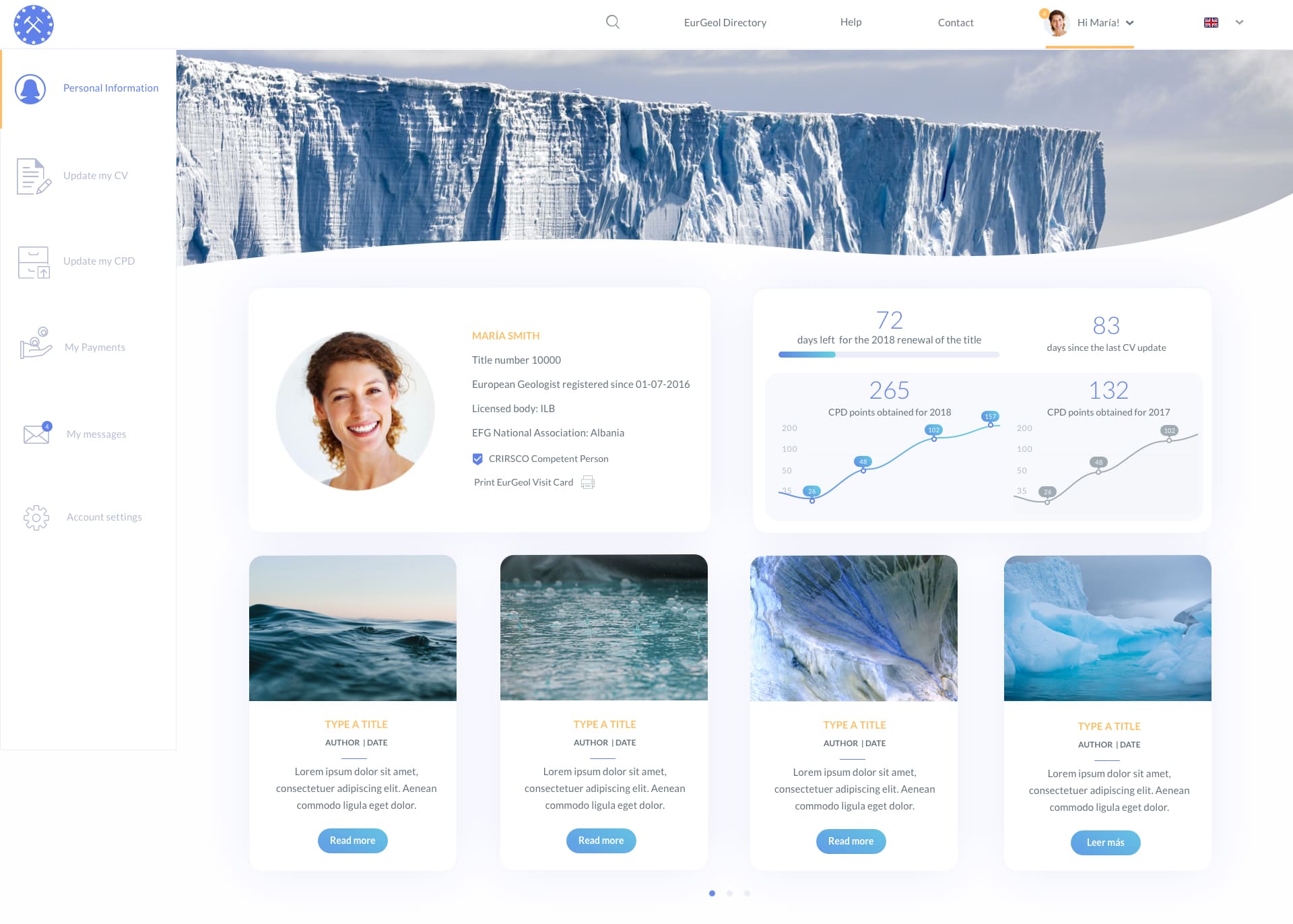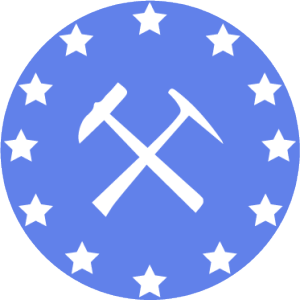EurGeol
The European Geologist titleAccreditation as a European Geologist
In various countries and sectors, geologists need accreditation to practice their profession. In Europe, the title European Geologist (EurGeol) exists for this purpose. The title is open to all earth scientists working in their profession in industry, knowledge institutions, academia or government. A candidate must have completed at least a Master’s degree in earth sciences and have sufficient relevant work experience. A European Geologist commits to a professional code of ethics and actively maintains knowledge in order to continue to hold the title. In addition to Europe, the title is recognized in North America by the American Institute of Professional Geologists (AIPG) and the Canadian Council of Professional Geologists (CCPG). Furthermore, EurGeol titleholders may endorse geological reports recognized by stock and commodity exchanges in Canada, Australia and South Africa.
EGF and accreditation

The management and issuance of the EurGeol title is carried out and coordinated by the European Federation of Geologists (EFG). Founded in 1980, the organization represents at the European level a large number of national societies of professional geologists, such as the KNGMG in the Netherlands. One of the EFG’s objectives is to promote the free movement of labor within Europe, in which the EurGeol title is instrumental.
KNGMG and accreditation
In Ireland, Spain, the United Kingdom and Switzerland, a National License Body is authorized to issue the EurGeol title. In the other countries, including the Netherlands, a National Vetting Committee handles the preselection and accreditation is done by the International License Body of the EFG. The application procedure in the Netherlands includes the following steps:
The candidate must be a member of the KNGMG.
The candidate completes the application form and asks at least two EurGeols who know him or her well in the field of his or her work to complete and sign a so-called sponsorship letter. Note: in the start-up phase, if necessary, sponsors who do not (yet) hold the EurGeol title may also be listed. The file should be sent to the KNGMG secretariat.
The candidate is invited for an interview from which it should become clear whether he/she has sufficient experience and knowledge. This interview takes place with at least two designated people from the field.
The National Vetting Committee makes a report and sends it, together with an advice, to the International License Body in Brussels. The latter makes the decision to honor or reject the title; the applicant is notified by letter.
Upon approval, the EurGeol holder pays €58 (€30 registration and €28 annual fee) and is then added to the list of EurGeol holders published on the EFG website. The EurGeol holder receives a certificate.
In addition to the generally applicable regulations of the EFG, the NVC maintains two national regulations:
Composition of the National Vetting Committee for the Netherlands
Martin Galavazi
Bob Hoogendoorn
Cees Laban
Michiel van der Meulen
Kees van Ojik
For more information on the EurGeol title, visit the EFG website.
Annual renewal
A condition for granting and renewing the EurGeol title is that the applicant commits to the so-called “Continuing Professional Development” concept. This means that the holder of the EurGeol title demonstrably develops every year by, for example, attending courses, visiting conferences, writing articles or doing self-study. But also, for example, performing a management function at the society falls under professional development. This should be reported (briefly) annually; criteria and a template are available on the EFG website. Below are tips for completing this template.
Tips for Annual Renewal – the EurGeol CPD record
With special thanks to Michiel van der Meulen.
If you have obtained your EurGeol title, you must complete your CPD record at the turn of the year to renew your title. A special EurGeol App has been developed for this purpose. The web address for this is: https://eurgeoltitle.eu.
When you get there, log in and get to your own profile. Then choose ‘CPD update’. After this it is self-explanatory.
How to fill this in is explained at http://eurogeologists.eu/maintaining-your-title/, most extensively in the EGF regulation E6 ‘Continuing Professional Development’, which you can download there. A short, practical guideline is as follows:
Under Professional practice, you do not enter daily or routine activities, but activities that go beyond daily practice. It’s subjective; the test is whether you (or the profession) will further develop.
Formal learning (tested) refers to courses for which a certificate is issued with a form of so-called education credits, specifically for CPD records in licensed professions. There are different types, but they can always be traced back to the number of study load hours. On the certificate it will say, for example, “0.80 Continuing Education Credits” which corresponds to 8 study load hours, which you enter into the system with the certificate as proof.
Formal learning (untested) are courses for which a certificate of successful attendance has been issued, but without an official course load as described above.
At Informal learning/training you can enter conference attendance. Internal company courses relevant to the field are also included.
Self-directed study is a bit of an odd, hard-to-prove category (“I read a book at home”), therefore prefer not to use it.
At Non-work activitities you can list anything that could be considered a service to the profession: time spent on memberships in earth science committees and councils (KNGMG, IUGS, EFG, NCG), teaching activities, popularization of geology, etc.
At Contributing to knowledge you can include all things leading to earth science publications: scientific papers and conference presentations, as well as review work.
Be practical with supporting documents. An abstract of a paper, a piece of your presentation (< 2 Mb), a copy of a colophon or a screenshot of a website where your name is mentioned in relation to an activity. For example, you can also ask your supervisor to confirm that you took an internal course.
New rules since 2019
In 2019, the rules regarding the annual CPD have changed. The new rules are here: eurogeologists.eu/efg-council-approves-revised-cpd-scheme
One of the new rules is that you must have a minimum of 2 credits (4 hours) in two new categories:
- Social Responsibility (RS): first aid, fire protection, mine rescue etc.
- Ethics (ETH): courses on ethics and compliance in professional life.
If you work for a mining company or in a laboratory, or are a first aider, meeting this minimum requirement is not that difficult. For office workers, however, it’s more difficult. After all, such an ethics course is not something you do annually, and the safety training you participate in usually does not go beyond the occasional evacuation exercise.
KNGMG discussed this with EFG in late 2019. EFG then agreed to look at creating an “interim solution” for office workers. However, what that will look like and when it will take effect is still unclear. Until then, the advice is to spend some time on the topics through self-study. Consider perusing IAPG’s geo-ethics website: http://www.geoethics.org/. And evacuation drills also count.
Top picture © Earthfocus by Jeroen Peters copyright


